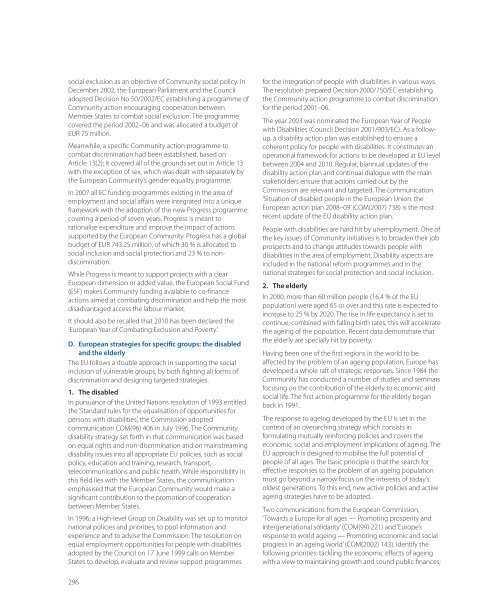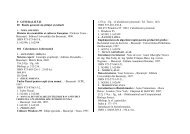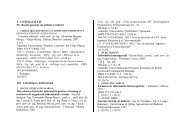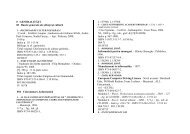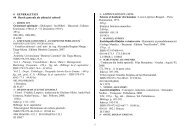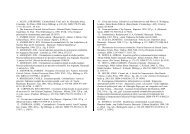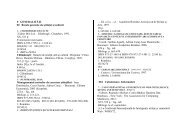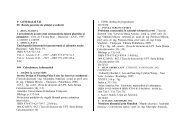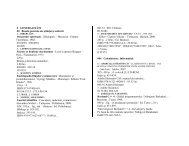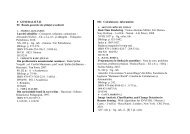Fact Sheets on the European Union â 2 - EU Bookshop - Europa
Fact Sheets on the European Union â 2 - EU Bookshop - Europa
Fact Sheets on the European Union â 2 - EU Bookshop - Europa
You also want an ePaper? Increase the reach of your titles
YUMPU automatically turns print PDFs into web optimized ePapers that Google loves.
social exclusi<strong>on</strong> as an objective of Community social policy. In<br />
December 2002, <strong>the</strong> <strong>European</strong> Parliament and <strong>the</strong> Council<br />
adopted Decisi<strong>on</strong> No 50/2002/EC establishing a programme of<br />
Community acti<strong>on</strong> encouraging cooperati<strong>on</strong> between<br />
Member States to combat social exclusi<strong>on</strong>. The programme<br />
covered <strong>the</strong> period 2002–06 and was allocated a budget of<br />
<strong>EU</strong>R 75 milli<strong>on</strong>.<br />
Meanwhile, a specific Community acti<strong>on</strong> programme to<br />
combat discriminati<strong>on</strong> had been established, based <strong>on</strong><br />
Article 13(2); it covered all of <strong>the</strong> grounds set out in Article 13<br />
with <strong>the</strong> excepti<strong>on</strong> of sex, which was dealt with separately by<br />
<strong>the</strong> <strong>European</strong> Community’s gender equality programme.<br />
In 2007 all EC funding programmes existing in <strong>the</strong> area of<br />
employment and social affairs were integrated into a unique<br />
framework with <strong>the</strong> adopti<strong>on</strong> of <strong>the</strong> new Progress programme:<br />
covering a period of seven years, Progress is meant to<br />
rati<strong>on</strong>alise expenditure and improve <strong>the</strong> impact of acti<strong>on</strong>s<br />
supported by <strong>the</strong> <strong>European</strong> Community. Progress has a global<br />
budget of <strong>EU</strong>R 743.25 milli<strong>on</strong>, of which 30 % is allocated to<br />
social inclusi<strong>on</strong> and social protecti<strong>on</strong> and 23 % to n<strong>on</strong>discriminati<strong>on</strong>.<br />
While Progress is meant to support projects with a clear<br />
<strong>European</strong> dimensi<strong>on</strong> or added value, <strong>the</strong> <strong>European</strong> Social Fund<br />
(ESF) makes Community funding available to co-finance<br />
acti<strong>on</strong>s aimed at combating discriminati<strong>on</strong> and help <strong>the</strong> most<br />
disadvantaged access <strong>the</strong> labour market.<br />
It should also be recalled that 2010 has been declared <strong>the</strong><br />
‘<strong>European</strong> Year of Combating Exclusi<strong>on</strong> and Poverty’.<br />
D. <strong>European</strong> strategies for specific groups: <strong>the</strong> disabled<br />
and <strong>the</strong> elderly<br />
The <strong>EU</strong> follows a double approach in supporting <strong>the</strong> social<br />
inclusi<strong>on</strong> of vulnerable groups, by both fighting all forms of<br />
discriminati<strong>on</strong> and designing targeted strategies.<br />
1. The disabled<br />
In pursuance of <strong>the</strong> United Nati<strong>on</strong>s resoluti<strong>on</strong> of 1993 entitled<br />
<strong>the</strong> ‘Standard rules for <strong>the</strong> equalisati<strong>on</strong> of opportunities for<br />
pers<strong>on</strong>s with disabilities’, <strong>the</strong> Commissi<strong>on</strong> adopted<br />
communicati<strong>on</strong> COM(96) 406 in July 1996. The Community<br />
disability strategy set forth in that communicati<strong>on</strong> was based<br />
<strong>on</strong> equal rights and n<strong>on</strong>-discriminati<strong>on</strong> and <strong>on</strong> mainstreaming<br />
disability issues into all appropriate <strong>EU</strong> policies, such as social<br />
policy, educati<strong>on</strong> and training, research, transport,<br />
telecommunicati<strong>on</strong>s and public health. While resp<strong>on</strong>sibility in<br />
this field lies with <strong>the</strong> Member States, <strong>the</strong> communicati<strong>on</strong><br />
emphasised that <strong>the</strong> <strong>European</strong> Community would make a<br />
significant c<strong>on</strong>tributi<strong>on</strong> to <strong>the</strong> promoti<strong>on</strong> of cooperati<strong>on</strong><br />
between Member States.<br />
In 1996, a High-level Group <strong>on</strong> Disability was set up to m<strong>on</strong>itor<br />
nati<strong>on</strong>al policies and priorities, to pool informati<strong>on</strong> and<br />
experience and to advise <strong>the</strong> Commissi<strong>on</strong>. The resoluti<strong>on</strong> <strong>on</strong><br />
equal employment opportunities for people with disabilities<br />
adopted by <strong>the</strong> Council <strong>on</strong> 17 June 1999 calls <strong>on</strong> Member<br />
States to develop, evaluate and review support programmes<br />
for <strong>the</strong> integrati<strong>on</strong> of people with disabilities in various ways.<br />
The resoluti<strong>on</strong> prepared Decisi<strong>on</strong> 2000/750/EC establishing<br />
<strong>the</strong> Community acti<strong>on</strong> programme to combat discriminati<strong>on</strong><br />
for <strong>the</strong> period 2001–06.<br />
The year 2003 was nominated <strong>the</strong> <strong>European</strong> Year of People<br />
with Disabilities (Council Decisi<strong>on</strong> 2001/903/EC). As a followup,<br />
a disability acti<strong>on</strong> plan was established to ensure a<br />
coherent policy for people with disabilities. It c<strong>on</strong>stitutes an<br />
operati<strong>on</strong>al framework for acti<strong>on</strong>s to be developed at <strong>EU</strong> level<br />
between 2004 and 2010. Regular, biannual updates of <strong>the</strong><br />
disability acti<strong>on</strong> plan and c<strong>on</strong>tinual dialogue with <strong>the</strong> main<br />
stakeholders ensure that acti<strong>on</strong>s carried out by <strong>the</strong><br />
Commissi<strong>on</strong> are relevant and targeted. The communicati<strong>on</strong><br />
‘Situati<strong>on</strong> of disabled people in <strong>the</strong> <strong>European</strong> Uni<strong>on</strong>: <strong>the</strong><br />
<strong>European</strong> acti<strong>on</strong> plan 2008–09’ (COM(2007) 738) is <strong>the</strong> most<br />
recent update of <strong>the</strong> <strong>EU</strong> disability acti<strong>on</strong> plan.<br />
People with disabilities are hard hit by unemployment. One of<br />
<strong>the</strong> key issues of Community initiatives is to broaden <strong>the</strong>ir job<br />
prospects and to change attitudes towards people with<br />
disabilities in <strong>the</strong> area of employment. Disability aspects are<br />
included in <strong>the</strong> nati<strong>on</strong>al reform programmes and in <strong>the</strong><br />
nati<strong>on</strong>al strategies for social protecti<strong>on</strong> and social inclusi<strong>on</strong>.<br />
2. The elderly<br />
In 2000, more than 60 milli<strong>on</strong> people (16.4 % of <strong>the</strong> <strong>EU</strong><br />
populati<strong>on</strong>) were aged 65 or over and this rate is expected to<br />
increase to 25 % by 2020. The rise in life expectancy is set to<br />
c<strong>on</strong>tinue; combined with falling birth rates, this will accelerate<br />
<strong>the</strong> ageing of <strong>the</strong> populati<strong>on</strong>. Recent data dem<strong>on</strong>strate that<br />
<strong>the</strong> elderly are specially hit by poverty.<br />
Having been <strong>on</strong>e of <strong>the</strong> first regi<strong>on</strong>s in <strong>the</strong> world to be<br />
affected by <strong>the</strong> problem of an ageing populati<strong>on</strong>, Europe has<br />
developed a whole raft of strategic resp<strong>on</strong>ses. Since 1984 <strong>the</strong><br />
Community has c<strong>on</strong>ducted a number of studies and seminars<br />
focusing <strong>on</strong> <strong>the</strong> c<strong>on</strong>tributi<strong>on</strong> of <strong>the</strong> elderly to ec<strong>on</strong>omic and<br />
social life. The first acti<strong>on</strong> programme for <strong>the</strong> elderly began<br />
back in 1991.<br />
The resp<strong>on</strong>se to ageing developed by <strong>the</strong> <strong>EU</strong> is set in <strong>the</strong><br />
c<strong>on</strong>text of an overarching strategy which c<strong>on</strong>sists in<br />
formulating mutually reinforcing policies and covers <strong>the</strong><br />
ec<strong>on</strong>omic, social and employment implicati<strong>on</strong>s of ageing. The<br />
<strong>EU</strong> approach is designed to mobilise <strong>the</strong> full potential of<br />
people of all ages. The basic principle is that <strong>the</strong> search for<br />
effective resp<strong>on</strong>ses to <strong>the</strong> problem of an ageing populati<strong>on</strong><br />
must go bey<strong>on</strong>d a narrow focus <strong>on</strong> <strong>the</strong> interests of today’s<br />
oldest generati<strong>on</strong>s. To this end, new active policies and active<br />
ageing strategies have to be adopted.<br />
Two communicati<strong>on</strong>s from <strong>the</strong> <strong>European</strong> Commissi<strong>on</strong>,<br />
‘Towards a Europe for all ages — Promoting prosperity and<br />
intergenerati<strong>on</strong>al solidarity’ (COM(99) 221) and ‘Europe’s<br />
resp<strong>on</strong>se to world ageing — Promoting ec<strong>on</strong>omic and social<br />
progress in an ageing world’ (COM(2002) 143), identify <strong>the</strong><br />
following priorities: tackling <strong>the</strong> ec<strong>on</strong>omic effects of ageing<br />
with a view to maintaining growth and sound public finances;<br />
296


